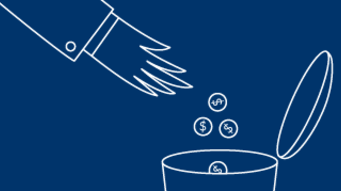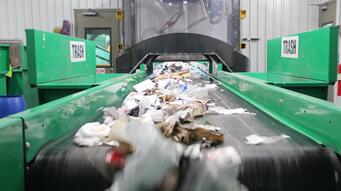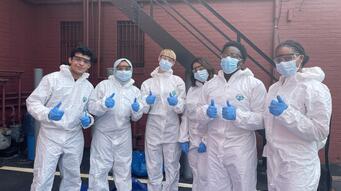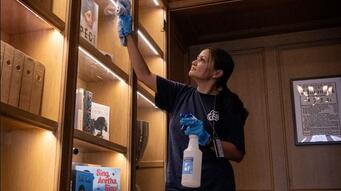Materials
Using and Reusing Materials to Inspire
University operations and academics require a vast array of materials - from art supplies to furniture, from medical equipment to sports uniforms, from construction materials to food. Yale helps drive sustainability within this complex materials system by leveraging relationships with suppliers and using data to inspire, incentivize, and empower our community members.
Yale’s Efforts
- We continually look for opportunities to encourage reuse of products within the Yale community and beyond. Spring Salvage donates items from students leaving the University.
- Yale’s purchasing professionals play an important role in advancing responsible materials management. Learn about Procurement’s sustainability goals and initiatives.
- Managing the disposal of items leaving campus is a complex process. We strive for transparency, and look to the Yale community help us reach our goals.
What You Can Do
- Buy or sell, donate and find! Turn to the Eli Surplus Exchange to keep resources on campus.
Our Objectives and Goals
Purchasing Standards
Advance purchasing standards that promote sustainability and resilience
Yale rolled out a comprehensive update of campuswide waste signage in fall 2024 in response to community feedback and with the aim of improving waste diversion rates. New signs and a redesigned website aim to provide clearer guidance for users about singlestream recycling, food waste, laboratory and electronic waste, and trash. An accompanying video campaign on Instagram produced by the Yale Office of Public Affairs & Communications reached more than 200,000 viewers and was nominated for a regional Emmy award.
Healthy Materials Purchasing
By 2025, implement sustainable purchasing practices for specific commodity groups.
With the completion of the Yale Divinity School’s Living Village, the Yale Office of Facilities is assessing how the healthy material choices of this regenerative building project can be adopted into university design standards and applied more broadly across capital projects. Projects in design and construction today are setting and enforcing material screening criteria.
Material Flow Systems
Promote material flow systems that employ use and disposal patterns to inform purchasing decisions
Pay As You Throw
By January 2022, create, pilot, and assess a “pay as you throw” system.
This goal was achieved in 2019. Outcomes from Yale’s Pay As You Throw pilot, the first of its kind at an American higher education institution, continue to be used.
Targeted Waste Reduction
By 2020, identify the most impactful commodity groups that contribute to Yale’s waste stream through material flow analyses.
This goal was achieved in 2020. Material flow analyses on pallets, animal bedding, paper, cardboard, and plastic bags were completed, and a life cycle assessment on plastic utensils and compostable utensils was conducted. All of these projects were collaborations between student researchers, staff, and faculty, and the findings continue inform our work.
Purchasing and Disposal Decision-Making
Cultivate sustainable purchasing and disposal decisions
Materials Outreach and Engagement
By 2020, create and launch an engagement strategy to empower Yale students, staff, and faculty to make responsible materials management choices, including communications about purchasing volume for key commodities; reuse; and diversion of materials from the waste stream.
This goal was achieved in 2020, and continued reporting will be done under the goals of “Waste Diversion” and “Green Cleaning.”
Waste Diversion
By 2025, divert 60% of materials while maintaining or reducing overall volume of waste.
Waste diversion continues to be a considerable challenge at Yale; we diverted only 29 percent of our day-to-day operational waste in 2025, down from 34 percent in 2024. To begin to address this, a comprehensive recycling campaign was rolled out, including an update to the Yale Recycling website, a series of PSA-style videos, and an overhaul of waste and recycling signs across the university. Construction and demolition waste diversion improved from 76 percent in 2024 to 79 percent in 2025.
Green Cleaning
By 2025, 40% of cleaning chemicals used, by volume, should be green-preferred or green-certified.
In 2024, 54 percent (by volume) of cleaning products purchased were green-preferred or green-certified. In addition, the deployment of new technology that uses only salt, water, and electricity to generate sustainable cleaning solutions continues to expand.
Reuse
By 2025, create a suite of coordinated solutions for exploring inflow and outflow of high-volume materials by identifying opportunities for reuse within Yale, the New Haven community, and the region.
2025 marked the twentieth anniversary of Spring Salvage, Yale’s annual undergraduate student moveout program. Over 61,000 pounds of items were diverted from the waste stream this year; over two decades, more than 640 tons of material have been donated as a result of this program.













